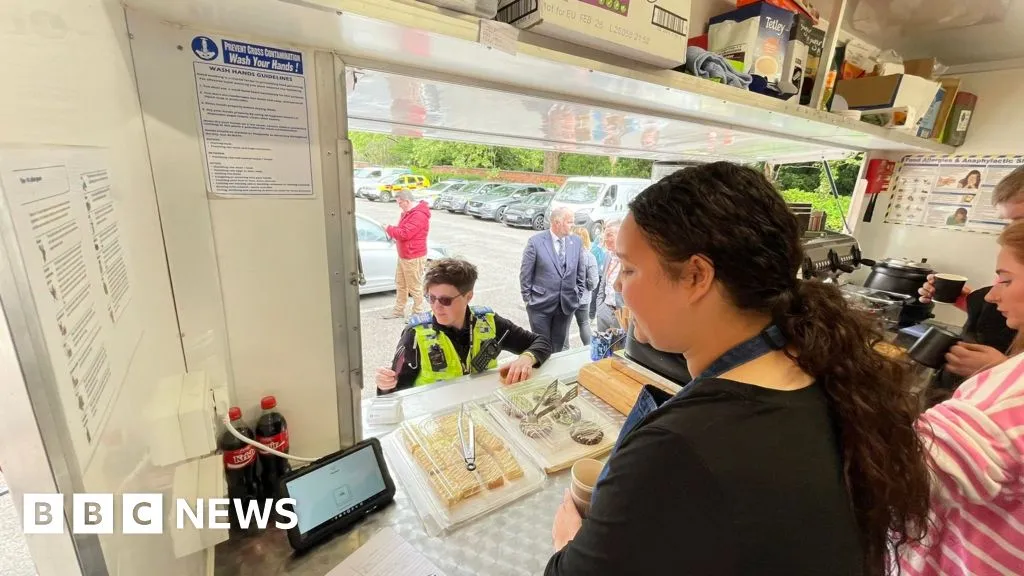An old burger van selling coffee and sandwiches from an office car park doesn't sound like anything special, but there's one in Swindon helping keep young offenders out of custody.
Supervised by youth workers, young people train how to be baristas, learning skills such as customer service and teamwork. It's part of a new approach to prevent young people from reoffending by encouraging a shift in their identity.
As the male adult prison population has soared, the number of under-18s behind bars in England and Wales has dropped markedly in the past 20 years, from about 3,000 to just over 400 - a record low.
There has been a concerted effort to keep young people out of custody and deal with them in the community instead, which has had a huge impact in Swindon, a town regularly affected by gang and knife crime.
Kika is 18 and received her first court order to attend Swindon's Youth Justice Service when she was 14 years old.
"I started going from petty antisocial behaviour to serious violent crimes and just disrupting the entire town," she explains. "That landed me in a whole heap of trouble."
There are youth justice teams in each local authority in England and Wales, which work with 10 to 17 year olds who have been in trouble with the law.
Some young people are ordered by a court to attend as part of a sentence. Others might be sent by the police after being arrested.
Swindon's Youth Justice Service was rated Outstanding in its latest inspection. In the past few years it has embraced a new approach called "Child First" which the Youth Justice Board - which oversees youth justice in England and Wales - wants all its community teams to use.
This centres on treating young people as children first, rather than offenders - and letting them help come up with a plan to move them away from crime.
The BBC's File on 4 Investigates programme has spent time at the Swindon Youth Justice Service, finding out how their approach is impacting young people referred there.
Swindon has been affected by gang-related youth violence, including knife crime. It used to have one of highest rates of custody for under-18s in the country, but it's now below the national average and reoffending rates have been coming down.
Kika, who spent part of her childhood in care, told the BBC she grew up in a "very impoverished area with a lot of crime".
When she was first ordered to attend Swindon's Youth Justice Service, Kika says: "I hated every second of being here."
"I was previously treated by other services like I was a case rather than a kid. I felt like these guys don't actually care about why I'm here or what's going on in my life. Just like everyone else hadn't cared."
Eventually Kika’s attitude changed. She recalls: “They [the youth justice team] acknowledged that I am just human and I’m reacting how a lot of humans would in the situations I’ve been put in.”
As part of the Child First approach, young offenders are given the opportunity to try new activities and build on their strengths, with the aim of changing how they think and feel about themselves. The hope is that this shift in identity will help them leave crime behind for good.
Kika didn't want to be photographed but she says one of the key activities that helped her turn her life around was a creative writing session a couple of years ago with a poet and author who had spent time in prison, now known as Lady Unchained.
The poem that Kika wrote as part of the session was featured in a book, and put on display in Swindon library.
"Walking in there and seeing it I thought, this is cool. I’m getting somewhere," she says.
"This is how I’m meant to feel about life. I’m not always meant to feel that anguish about the things that I’ve been doing."
On the BBC's File on 4 Investigates programme we reunited Kika and Lady Unchained. It's an emotional moment for Kika.
"I dunno if you remember me, but you helped me out a lot. Honestly, you helped me change my life," she told her.
Kika explains how it was Lady Unchained’s honesty that helped convince her to move away from crime.
"You opened up about how prison was and how it affected you, and it put fear in me to be honest with you.
"I needed someone to be truthful about how prison affects them because the people around me weren't truthful. They kept feeding me this lie that prison's just a holiday."
For Lady Unchained it was an emotional moment to hear how her work had impacted Kika.
"I just want to say well done, I'm so proud of you and literally even hearing you speak makes me so happy, but also it gives me more energy to continue doing the work that I'm doing," she said.
Kika is now a peer mentor at Swindon's Youth Justice Service, using her experience to help other young people.
Reflecting on where she would have been without this intervention, Kika seems certain. "In prison." She says she would have continued committing violent offences, but that now she looks for a different type of adrenaline.
"I want to go skydiving, and hiking, and see the peaks of this earth - not just look for where I can get my next fight at. I don't want to do that anymore."
